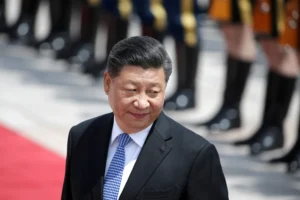The son of Colombian President Gustavo Petro has agreed to cooperate with prosecutors after facing charges of money laundering and illicit enrichment.
But allegations in the case threaten to dent the president’s already-declining public approval ratings, as questions swirl about the financing of his 2022 election campaign.
On Friday, both the prosecution and the defence requested that Nicolás Petro, the president’s 37-year-old son, receive house arrest while the case against him proceeds.
“If he went to jail, he wouldn’t last 24 hours. We can assure it,” defence lawyer David Teleki told the newspaper El Colombiano. “There are people here who do not want the truth to be known.”
The younger Petro was arrested on July 29 for allegedly taking money from individuals with drug-trafficking ties, on the supposed premise he could help them benefit from his father’s plans to bring peace to Colombia.

How did the accusations emerge?
The accusations first emerged in an interview that Nicolás Petro’s ex-wife, Daysuris “Day” Vásquez, had with the news magazine Semana in March.
She accused the younger Petro of accepting donations for his father’s presidential campaign from people with “a dark past”.
One of those individuals, she said, was Samuel Santander Lopesierra, a former senator and convicted drug trafficker who was extradited to the United States in 2003. He has since been released and returned to Colombia to continue his political career.
Vásquez said the deliveries were made in cash, including 600 million pesos ($144,810) from Santander Lopesierra.
But the money never went to the presidential campaign, she added. She accused her ex-husband of keeping the funds for himself.
“Everything has been behind his father’s back,” Vásquez told the magazine. “I must clarify that.”
Colombia’s attorney general announced an investigation shortly after the allegations were published. Vásquez herself was ultimately arrested and charged in the alleged money laundering scheme. Both she and Nicolás Petro are being held in Bogotá.

What have the prosecutors said?
On Thursday, the prosecution team, led by Mario Andres Burgos, announced that the younger Petro would cooperate with investigators.
Burgos said Nicolás Petro also admitted that some of the dubious funds ended up in his father’s election campaign, without being properly reported.
“Nicolás Fernando Petro Burgos gave relevant information that was unknown until now by the attorney general’s office,” Burgos said at Thursday’s court hearing.
The younger Petro has pleaded not guilty, but his cooperation with prosecutors could lessen any eventual sentence. Experts say he could face 12 to 20 years in prison if convicted.
The prosecutors have accused Nicolás Petro of pocketing $394,000 from sources outside of his work to buy luxury properties and cars as well.
Some $270,000 also came from Santander Lopesierra and Gabriel Hilsaca, the son of a scandal-plagued businessman on trial for murder and criminal conspiracy, according to prosecutors.
How does this affect President Petro?
Since the scandal broke, Nicolás Petro has stepped down from his position in the departmental assembly for Atlántico, a northern region on Colombia’s Caribbean coast.
But the case could have further ramifications for his father, the president, who faces declining poll numbers and heavy opposition in Congress.
When Gustavo Petro was sworn into office in August 2022, he became known as Colombia’s first left-wing president. But he inherited a country immersed in six decades of internal conflict, leaving approximately 450,664 people dead between 1985 and 2018 alone.
Petro’s answer was a platform of “total peace” — a proposal to end the conflict by engaging in negotiations and dialogues with armed groups and criminal organisations.
On Thursday, a six-month ceasefire went into effect with the National Liberation Army (ELN), the largest remaining rebel group.
But his administration’s peace efforts have produced uneven results. The port city of Buenaventura, once held up as a model for peace, has seen its gang truce falter. And right-wing politicians have seized the opportunity to criticise the “total peace” plan as ineffectual.
Petro has also faced scrutiny in recent months for other campaign finance allegations. In May, Semana magazine reported on leaked phone recordings featuring Armando Benedetti, Petro’s former campaign manager.
The recordings purported to capture Benedetti threatening to reveal damning evidence about the campaign’s financing.
Faced with the scandal and a stalemate over his social reforms in Congress, Petro has seen his public approval numbers slip. A recent Invamer poll found he had a disapproval rating of 61 percent.
https://imasdk.googleapis.com/js/core/bridge3.584.2_en.html#goog_1407973817Play Video
Video Duration 02 minutes 40 seconds02:40Colombia ‘s Petro appeals for Congress to pass social reforms
How has President Petro responded?
On July 29, President Petro posted on social media that news of his son’s arrest “hurt him a lot” but that the prosecution had his approval to proceed “in accordance with the law”.
“May these events forge his character, and he may reflect on his own mistakes,” Petro said of his son. “Let the law freely guide the process.”
The president has also denied any knowledge of his son’s activities. He has promised to stay in office for the full length of his four-year mandate.
On Friday, in the wake of the latest allegations about possible campaign finance irregularities, Petro issued another statement on social media, saying he learned the news “with pain”.
“I affirm and reiterate that no one is above the law and that justice must be applied impartially,” he wrote.
“On the other hand, I will resolutely continue with the presidential agenda. Nothing and no one can stop a lifetime of fighting against all forms of corruption, and the government will continue without distraction its work and commitment for a better Colombia.”
Source: AL JAZEERA










